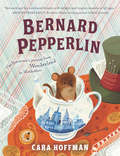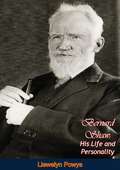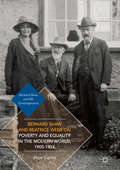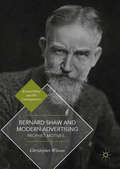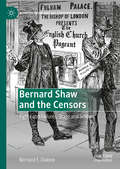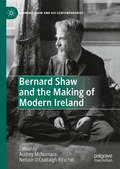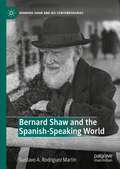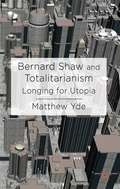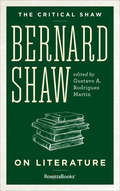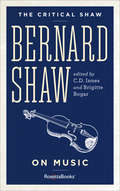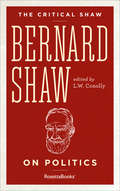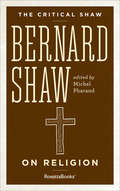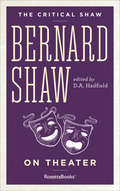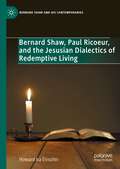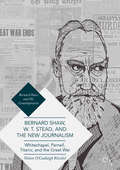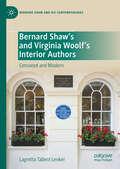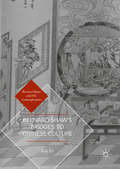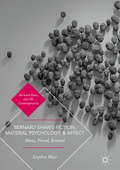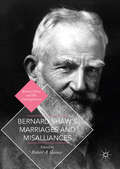- Table View
- List View
Bernard Pepperlin
by Cara Hoffman“Bernard and his newfound friends—revolutionary rats, wise-cracking cats, and coffee-chugging squirrels, to name a few—will delight and inspire readers of all ages!” —Erin Entrada Kelly, Newbery Medal-winning author of Hello, UniverseThe drowsy Dormouse from Lewis Carroll’s Alice’s Adventures in Wonderland is transported to modern-day New York City for the adventure of a lifetime in this middle grade novel that’s perfect for fans of Stuart Little and written by critically acclaimed author Cara Hoffman.When a girl in a blue dress crashes the Mad Hatter’s eternal tea party, the sleepy Dormouse feels more awake than he has in a long time. He wishes he could follow her and be a part of her adventure.And as luck would have it, a surprising twist of fate sends the Dormouse on an adventure of his own, where he must not fall asleep. For he is destined to save a magical world outside Wonderland, and it will take all his courage—and a few new friends—to do it.
Bernard Shaw: Volume 1, 1856-1898, The Search for Love
by Michael HolroydBiography of George Bernard Shaw from his birth to his marriage at age 42.
Bernard Shaw: Volume 3, 1918-1951, The Lure of Fantasy
by Michael HolroydBiography of George Bernard Shaw, from World War I to his death at age 94.
Bernard Shaw: Volume 2, 1898-1918, The Pursuit of Power
by Michael HolroydBiography of George Bernard Shaw from age 42 to age 62, at the height of his career.
Bernard Shaw: His Life and Personality
by Hesketh PearsonGeorge Bernard Shaw (1856-1950), known at his insistence simply as Bernard Shaw, was an Irish playwright, critic, polemicist, and political activist. His influence on Western theatre, culture and politics extended from the 1880s to his death and beyond.In 1901, Max Beerbohm wrote of Bernard Shaw “As a personality he is immortal.”Bernard Shaw worked with renowned English actor, director and author Hesketh Pearson in the writing of this great biography, which was first published in 1942. Drawing on Shaw’s recorded conversations, the book comes alive with the gaiety and magnetism of this great man.His harsh writings as a music critic.His writings to Ellen Terry.His discussions with Sydney and Beatrice Webb.His long preoccupation with death—and, of course, his revolutionary contribution to English theatre.All the many facets of Shaw’s character are drawn on in this fascinating biography. Shaw’s own words are used as often as possible, not only to explain his thoughts, but also to show the lucid succinct way in which he expressed them.“From its pages G.B.S. emerges as large as life and, if possible, twice as natural.”—Professor C. E. M. Joad
Bernard Shaw: A Reassessment
by Colin WilsonThe author devotes much thought to Shaw's formative years, 20-30, and how his novels built up the Shaw persona, and how his success changed him.
Bernard Shaw and Beatrice Webb on Poverty and Equality in the Modern World, 1905–1914 (Bernard Shaw and His Contemporaries)
by Peter GahanThis book investigates how, alongside Beatrice Webb's ground-breaking pre- World War One anti-poverty campaigns, George Bernard Shaw helped launch the public debate about the relationship between equality and democracy in a developed economy. The ten years following his great 1905 play on poverty Major Barbara present a puzzle to Shaw scholars, who have hitherto failed to appreciate both the centrality of the idea of equality in major plays like Getting Married, Misalliance, and Pygmalion, and to understand that his major political work, 1928's The Intelligent Woman's Guide to Socialism and Capitalism had its roots in this period before the Great War. As both the era's leading dramatist and leader of the Fabian Society, Shaw proposed his radical postulate of equal incomes as a solution to those twin scourges of a modern industrial society: poverty and inequality. Set against the backdrop of Beatrice Webb's famous Minority Report of the Royal Commission on the Poor Law 1905-1909 - a publication which led to grass-roots campaigns against destitution and eventually the Welfare State - this book considers how Shaw worked with Fabian colleagues, Sidney and Beatrice Webb, and H. G. Wells to explore through a series of major lectures, prefaces and plays, the social, economic, political, and even religious implications of human equality as the basis for modern democracy.
Bernard Shaw and Modern Advertising: Prophet Motives (Bernard Shaw and His Contemporaries)
by Christopher WixsonThis book charts how promotional campaigns in which Bernard Shaw participated were key crucibles within which agency and personality could re-negotiate their relationship to one another and to the consuming public. Concurrent with the rise of modern advertising, the creation of Shaw’s 'G.B.S.' public persona was achieved through masterful imitation of patent medicine marketing strategies and a shrewd understanding of the relationship between product and spokesman. Helping to enhance the visibility of his literary writing and dovetailing with his Fabian political activities, 'G.B.S.' also became a key figure in the evolution of testimonial endorsement and the professionalizing of modern advertising. The study analyzes multiple ad series in which Shaw was prominently featured that were occasions for self-promotion for both Shaw and the agencies, and presage the iconoclastic style of contemporary 'public personality' and techniques of celebrity marketing.
Bernard Shaw and the Censors: Fights and Failures, Stage and Screen (Bernard Shaw and His Contemporaries)
by Bernard F. Dukore“Dukore’s style is fluid and his wit delightful. I learned a tremendous amount, as will most readers, and Bernard Shaw and the Censors will doubtless be the last word on the topic.”- Michel Pharand, former editor of SHAW: The Journal of Bernard Shaw Studies and author of Bernard Shaw and the French (2001). "This book shows us a new side of Shaw and his complicated relationships to the powerful mechanisms of stage and screen censorship in the long twentieth century.” - - Lauren Arrington, Professor of English, Maynooth University, IrelandA fresh view of Shaw versus stage and screen censors, this book describes Shaw as fighter and failure, whose battles against censorship – of his plays and those of others, of his works for the screen and those of others – he sometimes won but usually lost. We forget usually, because ultimately he prevailed and because his witty reports of defeats are so buoyant, they seem to describe triumphs. We think of him as a celebrity, not an outsider; as a classic, not one of the avant-garde, of which Victorians and Edwardians were intolerant; as ahead of his time, not of it, when he was called “disgusting,” “immoral", and "degenerate.” Yet it took over three decades and a world war before British censors permitted a public performance of Mrs Warren’s Profession. We remember him as an Academy Award winner for Pygmalion, not as an author whose dialogue censors required deletions for showings in the United States. Scrutinizing the powerful stage and cinema censorship in Britain and America, this book focuses on one of its most notable campaigners against them in the last century.
Bernard Shaw and the Making of Modern Ireland (Bernard Shaw and His Contemporaries)
by Audrey McNamara Nelson O’Ceallaigh RitschelThis book is an anthology focused on Shaw’s efforts, literary and political, that worked toward a modernizing Ireland. Following Declan Kiberd’s Foreword and the editor’s Introduction, the contributing chapters, in their order of appearance, are from President of Ireland Michael D. Higgins, Anthony Roche, David Clare, Elizabeth Mannion, Nelson O’Ceallaigh Ritschel, Aisling Smith, Susanne Colleary, Audrey McNamara, Aileen R. Ruane, Peter Gahan, and Gustavo A. Rodriguez Martin. The essays establish that Shaw’s Irishness was inherent and manifested itself in his work, demonstrating that Ireland was a recurring feature in his considerations. Locating Shaw within the march towards modernizing Ireland furthers the recent efforts to secure Shaw’s place within the Irish spheres of literature and politics.
Bernard Shaw and the Spanish-Speaking World (Bernard Shaw and His Contemporaries)
by Gustavo A. Rodríguez MartínThis book explores, through a multidisciplinary approach, the immense influence exerted by Bernard Shaw on the Spanish-speaking world on both sides of the Atlantic. This collection of essays encompasses the reception and dissemination of his ideas; the translation of his works into Spanish; the performance history of his plays in Spain and Latin America; and Shaw’s influence on many key figures of literature in Spanish. It begins by delving into Shaw’s knowledge of Spanish literature and gauging his acquaintance with the Spanish cultural milieu throughout his tenure as an art, music, and theatre critic. His early exposure to Spanish-speaking culture later made the return trip in the form of profuse critical reception and theatrical success in countries like Spain, Argentina, Mexico, and Uruguay. This allows for a more detailed investigation into the unmistakable mark that Bernard Shaw left in the oeuvre of leading Spanish-speaking authors like Ramiro de Maeztu, Jorge Luis Borges or Nemesio Canales. This volume also assesses the translations of Shaw’s works into Spanish—while also providing a detailed publication history of these translations.
Bernard Shaw and Totalitarianism Longing for Utopia
by Matthew YdeThis book reveals the genuity of Shaw's totalitarianism by looking at his material - articles, speeches, letters, etc but is especially concerned with analyzing the utopian desire that runs through so many of Shaw's plays; looking at his political and eugenic utopianism as expressed in his drama and comparing this to his political totalitarianism.
Bernard Shaw Candida
by Dr Raghukul TilakThe central characters are clergyman James Morell, his wife Candida and a youthful poet, Eugene Marchbanks, who tries to win Candida's affections.
Bernard Shaw on Literature: On Literature (The Critical Shaw)
by George Bernard ShawA collection of literary criticism from the Nobel Prize–winning playwright behind such classics as Saint Joan and Pygmalion.The Critical Shaw: On Literature is a comprehensive selection of renowned Irish playwright and Nobel Laureate Bernard Shaw&’s ideas and opinions on a wide range of literary forms of expression, from Shakespearean drama to ghost stories, from naturalist novels to philosophical essays. Shaw meticulously applied his comprehensive knowledge of the intricacies of writing and publishing (composition, typesetting, style, themes, censorship) and in the process produced an extensive array of critical works spanning more than fifty years. Always with an axe to grind—whether aesthetic, ethical, or otherwise—Shaw tested the boundaries of satire in his critical essays, occasionally locking horns as a result with some of the most prominent authors of his lifetime. Displaying wit and wisdom in equal proportions, some of his reviews remain fresh even though the authors and books they appraised have long since fallen into oblivion. Shaw&’s views about literature challenged established conventions of the canon and helped to shape a renewed collective concept of literature.The Critical Shaw series brings together, in five volumes and from a wide range of sources, selections from Bernard Shaw&’s voluminous writings on topics that exercised him for the whole of his professional career: Literature, Music, Politics, Religion, and Theater. The volumes are edited by leading Shaw scholars, and all include an introduction, a chronology of Shaw&’s life and works, annotated texts, and a bibliography. The series editor is L.W. Conolly, literary adviser to the Shaw Estate and former president of the International Shaw Society.
Bernard Shaw on Music: On Music (The Critical Shaw)
by George Bernard ShawA collection of critical writings on music from the Nobel Prize–winning playwright behind Saint Joan and Man and Superman.The Critical Shaw: On Music is a comprehensive selection of renowned Irish playwright and Nobel Laureate Bernard Shaw&’s extensive writings on a wide range of musical topics. Still recognized as one of Great Britain&’s most important music critics, Shaw enriched London&’s musical scene for some twenty years with his provocative, original, and penetrating reviews, before giving up music criticism to concentrate his talents on playwriting. His vast critical output encompassed opera, operetta, vocal and orchestral performance, musical theater, and oratorios, and took in major composers and performers as well as many long since forgotten names. Frequently embellished by his controversial political and social opinions, and delving as well into the nature of music criticism itself, Shaw&’s reviews continue to stimulate and surprise, their depth and range setting standards that are rarely, if ever, matched today. Included in this edition is a previously unpublished draft on voice training prepared by Shaw for Vandeleur Lee, his mother&’s singing teacher.The Critical Shaw series brings together, in five volumes and from a wide range of sources, selections from Bernard Shaw&’s voluminous writings on topics that exercised him for the whole of his professional career: Literature, Music, Politics, Religion, and Theater. The volumes are edited by leading Shaw scholars, and all include an introduction, a chronology of Shaw&’s life and works, annotated texts, and a bibliography. The series editor is L.W. Conolly, literary adviser to the Shaw Estate and former president of the International Shaw Society.
Bernard Shaw on Politics: On Politics (The Critical Shaw)
by George Bernard ShawA collection of critical writings on politics from the Nobel Prize – winning playwright behind Saint Joan and Man and Superman. The Critical Shaw: On Politics is a comprehensive selection of renowned Irish playwright and Nobel Laureate Bernard Shaw&’s opinions on a wide range of political movements, ideologies, and events that helped shape the international landscape of the late nineteenth and early twentieth centuries. With unwavering conviction, and in many cases openly courting controversy and calumny, Shaw spoke his mind on the big &“-isms&” of his time: Socialism, Capitalism, Communism, and Fascism. He championed Socialism in its formative years, he condemned all combatants in the First World War, he berated America&’s embrace of Capitalism, he praised Russia&’s choice of Communism, he lauded Stalin, he rejected the notion that Hitler was responsible for the Second World War, and he scorned Democracy. Persistently provocative, sometimes outrageous, always the political iconoclast, Shaw's political convictions—as soapbox orator or world-famous pundit—challenge us to face the political issues and dilemmas of our own time with similar rigor and integrity.The Critical Shaw series brings together, in five volumes and from a wide range of sources, selections from Bernard Shaw&’s voluminous writings on topics that exercised him for the whole of his professional career: Literature, Music, Politics, Religion, and Theater. The volumes are edited by leading Shaw scholars, and all include an introduction, a chronology of Shaw&’s life and works, annotated texts, and a bibliography. The series editor is L.W. Conolly, literary adviser to the Shaw Estate and former president of the International Shaw Society.
Bernard Shaw on Religion: On Religion (The Critical Shaw)
by George Bernard ShawFrom the Nobel Prize–winning playwright behind Pygmalion and Saint Joan, a collection of his critical writings on religion.The Critical Shaw: On Religion is a comprehensive selection of renowned Irish playwright and Nobel Laureate Bernard Shaw&’s pronouncements—many of them deliberately inflammatory—on all facets of religion and belief: on Christianity and the Church; on various religions, among them Protestantism, Catholicism, Quakerism, Christian Science, Fundamentalism, Calvinism, Hinduism, Judaism, and Islam; on atheism and agnosticism, atonement and salvation; the crucifixion, the resurrection, transubstantiation, and the Immaculate Conception; on the Bible, the Ten Commandments, the Book of Common Prayer, and the Thirty-nine Articles of the Anglican Church. And much more. In speeches, essays, and prefaces, Shaw relentlessly scrutinized and critiqued scores of religions—only to find most of their doctrines in need of exhaustive reform. And yet, in keeping with his many other paradoxes, though Shaw was fond of calling himself an atheist, he nonetheless recognized the importance, indeed the necessity, of religion.The Critical Shaw series brings together, in five volumes and from a wide range of sources, selections from Bernard Shaw&’s voluminous writings on topics that exercised him for the whole of his professional career: Literature, Music, Politics, Religion, and Theater. The volumes are edited by leading Shaw scholars, and all include an introduction, a chronology of Shaw&’s life and works, annotated texts, and a bibliography. The series editor is L.W. Conolly, literary adviser to the Shaw Estate and former president of the International Shaw Society.
Bernard Shaw on Theater: On Theater (The Critical Shaw)
by George Bernard ShawA collection of critical writings on theater from the Nobel Prize–winning playwright behind Man and Superman and Pygmalion.The Critical Shaw: On Theater is a comprehensive selection of essays and addresses about drama and theater by renowned Irish playwright and Nobel Laureate Bernard Shaw. An outspoken critic of the melodramas and formulaic farces that comprised most of the popular theater in the late nineteenth century, Shaw relentlessly campaigned for audiences, actors, theater managers, and even government officials to take theater more seriously, to use the stage as a forum for representing complex real issues such as poverty, marriage and divorce laws, sexual attraction, gender equality, and political power, so that through seeing them acted out, audiences could better understand and address them when they left the theater. Shaw&’s commitment to social reform through theater was matched by his expertise in the artistic and practical aspects of drama: whether he was reviewing productions, lecturing about acting, or schooling agents on royalties and copyright law, Shaw set a standard for intelligent professionalism that our own theaters might still aspire to and be measured against.The Critical Shaw series brings together, in five volumes and from a wide range of sources, selections from Bernard Shaw&’s voluminous writings on topics that exercised him for the whole of his professional career: Literature, Music, Politics, Religion, and Theater. The volumes are edited by leading Shaw scholars, and all include an introduction, a chronology of Shaw&’s life and works, annotated texts, and a bibliography. The series editor is L.W. Conolly, literary adviser to the Shaw Estate and former president of the International Shaw Society.
Bernard Shaw, Paul Ricoeur, and the Jesusian Dialectics of Redemptive Living (Bernard Shaw and His Contemporaries)
by Howard Ira EinsohnThis book explores a heretofore unremarked linkage between Bernard Shaw, the twentieth-century French thinker Paul Ricoeur, and Jesus of Nazareth. The ties that bind them are a foundational interest in the social teachings of the Nazarene and their use of a shared dialectics with respect to living the kind of compassionate life that holds out the promise in our contemporary world of achieving something approximating universal wellness on a healthy planet at peace with itself. This work argues that the three principal subjects of the study—independently of one another—used the same dialectical method to reach the same dialectically derived conclusion about how humans can live redemptively in a fractured world.
Bernard Shaw, W. T. Stead, and the New Journalism
by Nelson O'Ceallaigh RitschelThis book explores Bernard Shaw’s journalism from the mid-1880s through the Great War—a period in which Shaw contributed some of the most powerful and socially relevant journalism the western world has experienced. In approaching Shaw’s journalism, the promoter and abuser of the New Journalism, W. T. Stead, is contrasted to Shaw, as Shaw countered the sensational news copy Stead and his disciples generated. To understand Shaw’s brand of New Journalism, his responses to the popular press’ portrayals of high profile historical crises are examined, while other examples prompting Shaw’s journalism over the period are cited for depth: the 1888 Whitechapel murders, the 1890-91 O’Shea divorce scandal that fell Charles Stewart Parnell, peace crusades within militarism, the catastrophic Titanic sinking, and the Great War. Through Shaw’s journalism that undermined the popular press’ shock efforts that prevented rational thought, Shaw endeavored to promote clear thinking through the immediacy of his critical journalism. Arguably, Shaw saved the free press.
Bernard Shaw’s and Virginia Woolf’s Interior Authors: Censored and Modern (Bernard Shaw and His Contemporaries)
by Lagretta Tallent LenkerVirginia Woolf and Bernard Shaw may be the odd couple of Twentieth Century modernism. Despite their difference in age (Shaw was twenty-six years older than Woolf), and public demeanor - Shaw sought public attention while Woolf shunned the spotlight - they actively held similar convictions on most of the pressing and controversial issues of the day. This book demonstrates that both engaged in social reform through the Fabian Society; both took public anti-war positions and paid dearly for it; both fought British censorship throughout most of their careers as writers; both sought to strengthen women’s rights; and both endeavored to revolutionize their respective art forms, believing that art could bring about positive social change. The main focus of the book, however, concerns how both also created interior authors - characters who write and who either self-censor their own works or highly publicized messages or are censored by their fellow characters. These fictional authors maybe considered reflections of their creators and their respective milieus and serve to illuminate the satisfactions and torments of each famous author during the writing process.
Bernard Shaw’s Bridges to Chinese Culture (Bernard Shaw and His Contemporaries)
by Kay LiThis book explores the cultural bridges connecting George Bernard Shaw and his contemporaries, such as Charles Dickens and Arthur Miller, to China. Analyzing readings, adaptations, and connections of Shaw in China through the lens of Chinese culture, Li details the negotiations between the focused and culturally specific standpoints of eastern and western culture while also investigating the simultaneously diffused, multi-focal, and comprehensive perspectives that create strategic moments that favor cross-cultural readings. With sources ranging from Shaw's connections with his contemporaries in China to contemporary Chinese films and interpretations of Shaw in the digital space, Li relates the global impact of not only what Chinese lenses can reveal about Shaw's world, but how intercultural and interdisciplinary readings can shed new light on familiar and obscure works alike.
Bernard Shaw’s Fiction, Material Psychology, and Affect: Shaw, Freud, Simmel (Bernard Shaw And His Contemporaries Ser.)
by Stephen WattThis book traces the effects of materiality - including money and its opposite, poverty - on the psychical lives of George Bernard Shaw and his characters. While this study focuses on the protagonists of the five novels Shaw wrote in the late 1870s and early 1880s, it also explores how materialism, feeling, and emotion are linked throughout his entire canon. At the same time, it demonstrates how Shaw’s conceptions of human subjectivity parallel those of two of his contemporaries, Sigmund Freud and Georg Simmel. In particular, this book explores how theories of so-called 'marginal economics' influence fin de siècle thought about human psychology and the sociology of the modern metropolis, particularly London.
Bernard Shaw's Marriages and Misalliances (Bernard Shaw and His Contemporaries)
by Robert A. GainesThis book combines the insights of thirteen Shavian scholars as they examine the themes of marriage, relationships and partnerships throughout all of Bernard Shaw's major works. It also connects Shaw's own experiences of love and marriage to the themes that emerge in his works, showing how his personal relationships in and out of matrimonial bonds change the ways his characters enter and exit marriages and misalliances. While providing a wealth of new analysis, this collection of essays also leaves lingering questions for the reader to spark continuing dialogue in both individual and academic settings.
Bernard the Brave (The Rescuers #8)
by Margery Sharpin this latest chronicle of that stalwart agency, the Mouse Prisoners' Aid Society, it is Miss Bianca's faithful right-hand mouse (and MPAS secretary), Bernard, who steps into the spotlight--and proves that the time for heroes, furry ears or no, has not passed. Miss Tomasina, orphan heiress to the Three Rivers Estate, has been kidnapped by her repulsive guardian just before her eighteenth birthday. If she doesn't appear in person to claim her inheritance, it will fall into the guardian's hands. With Miss Bianca away, time running out, and only one slim clue to follow, Bernard dashes off to her rescue. Together with his teddy bear ally, Algernon, Bernard surmounts avalanches and confounds bandit gangs with sparkling feats of short-running, whisker-twitching bravado. In the end, he returns with a rousing story that leaves even Miss Bianca's huge brown eyes glowing
